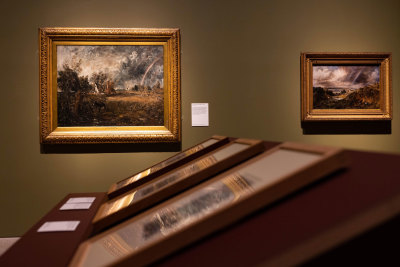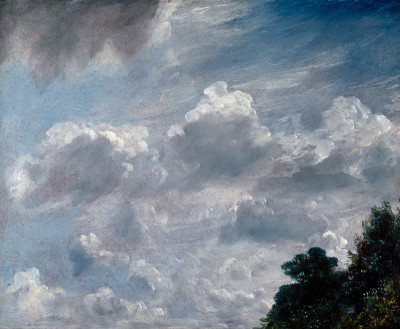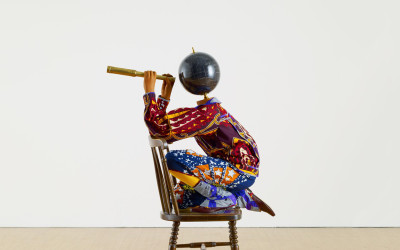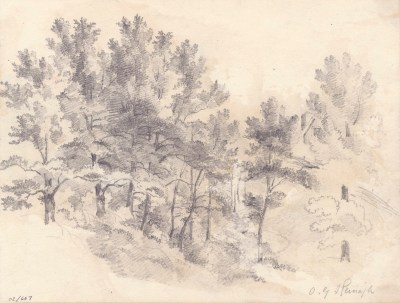Artist of the Month: July 2014
Artist of the Month: July 2014
Ruskin Spear RA (1911-1990)
By the RA Collection team
Published 2 July 2014
As a flamboyantly self-styled “working-class cockney”, Ruskin Spear RA found subjects for painting in the pubs, snooker halls and streets of Hammersmith, Fulham, Shepherd’s Bush and Chiswick.
-
Augustus John Ruskin Spear (1911-1990) was born in Hammersmith, west London, and lived in and around this area all of his life. Disabled by polio as a child he attended Brook Green School for afflicted children, where he first displayed a talent for and love of art. He won scholarships to Hammersmith School of Art (1926-1930) and the Royal College of Art (1930-34). At the RCA Spear studied under Sir William Rothenstein, who impressed upon him the importance of drawing as well as Gilbert Spencer and Charles Mahoney. Between 1941 and 1950 Spear taught at the Croydon, Sidcup, Bromley, St Martin’s, Central and Hammersmith Schools of art. During this period he supplemented his income by playing jazz piano in clubs. He went on to teach at the Royal College of Art from 1948-1975. Spear was elected to the London Group in 1942, becoming its president from 1949-50. He became an ARA in 1944 and an RA in 1954.
As a flamboyantly self-styled ‘working-class cockney’, he found subjects for painting in the pubs, snooker halls and streets of Hammersmith, Fulham, Shepherd’s Bush and Chiswick. Here he depicted his local theatre, the Old Lyric in Hammersmith as it looked in 1943.
-

Ruskin Spear RA, The Old Lyric Theatre, Hammersmith, 1943, 1979.
Oil on board. 80.2 X 99.4 X 0.4 cm. Photo: RA/Prudence Cuming Associates Limited. © Royal Academy of Arts, London.
-
The painting is something of a nostalgic piece, painted in 1979 just as the theatre had reopened after being dismantled and rebuilt on a nearby site. Spear chose an unusual angle from which to paint this view, possibly the upstairs window of a nearby building. Adjacent to the theatre is a Woolworth’s store, its exterior embellished with notices for a local second-hand furniture business. A hoarding decorated with colourful advertisements for OK Sauce and Seniors Fish and Meat Sauce cuts across the scene. The bold impact of these posters on the greys and browns of the cityscape relates to Spear’s interest in Pop art and popular culture.
Spear deeply admired the work of Walter Sickert and the Camden Town group, whose distinctly localised depictions of the grime and glitter of London life greatly influenced his own style. When he was elected a Royal Academician in 1954, he presented this portrait of Ernest Marsh as his Diploma work.
-

Ruskin Spear RA, Portrait of Ernest Marsh, ca. 1954.
Oil on canvas. 104.4 X 64.7 X 2 cm. Photo: RA. © Royal Academy of Arts.
-
Marsh sat for many portraits because Spear was attracted to distinctive physical attributes that revealed character. He explained his interest in Marsh was his “wonky eyes”. In his portraits Spear celebrated individuality and often developed relationships with his sitters believing that personal anecdotes allow for a deeper understanding of the sitter’s personality as communicated by the portrait. For Spear portraiture was his means of conveying a “description of personality.”
The portrait of Ernest Marsh reveals Spear’s skilful draughtsmanship and technical artistic process, as well as his innate interest in capturing the physical and psychological character of his sitter. Spear successfully conveys Marsh’s individuality through his body language and distinct facial features. Spear is known for his touches of light colour highlighting elements of the picture, for instance the detail on Marsh’s face and shirt collar. Spear often painted on coloured grounds, and here the pale blue of Marsh’s shirt is thinly applied revealing the use of a rich copper-brown ground colour which also appears in the flesh tones and Marsh’s trousers. This creates a cohesive composition unified by colour.
Another familiar subject for Spear was the regulars in his local pubs - the Hampshire Hog and the Ravenscourt Arms in Hammersmith, west London.
-

Ruskin Spear RA, Man in a Pub, c. 1960s.
Oil on canvas on board. 13.4 X 15 X 0.5 cm. Photo: RA/John Hammond. © Royal Academy of Arts, London.
-
Here, a small elderly man, in a cloth cap is shown from a low viewpoint behind the bar. His head is partially cut off by one of three black skittle-like beer-taps, giving the impression that the picture was not a formally posed composition but a surreptitious sketch. While Spear depicted local characters like these with a gentle empathic humour, he also painted many portraits of public figures, including politicians and members of the royal family.
-
See more by Ruskin Spear RA in our Collection.






